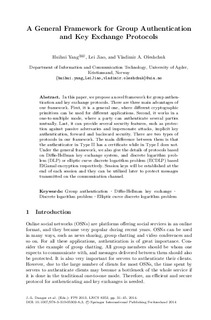A general framework for group authentication and key exchange protocols
Chapter, Peer reviewed
Permanent lenke
http://hdl.handle.net/11250/281322Utgivelsesdato
2014Metadata
Vis full innførselOriginalversjon
Yang, H., Jiao, L., & Oleshchuk, V. A. (2014). A general framework for group authentication and key exchange protocols Foundations and Practice of Security (Vol. 8352 LNCS, pp. 31-45): Springer. 10.1007/978-3-319-05302-8_3Sammendrag
In this paper, we propose a novel framework for group authentication and key exchange protocols. There are three main advantages of our framework. First, it is a general one, where different cryptographic primitives can be used for different applications. Second, it works in a one-to-multiple mode, where a party can authenticate several parties mutually. Last, it can provide several security features, such as protection against passive adversaries and impersonate attacks, implicit key authentication, forward and backward security. There are two types of protocols in our framework. The main difference between them is that the authenticator in Type II has a certificate while in Type I does not. Under the general framework, we also give the details of protocols based on Diffie-Hellman key exchange system, and discrete logarithm problem (DLP) or elliptic curve discrete logarithm problem (ECDLP) based ElGamal encryption respectively. Session keys will be established at the end of each session and they can be utilized later to protect messages transmitted on the communication channel.
Beskrivelse
Published version of a chapter in the book: Foundations and Practice of Security. Also available from the publisher at: http://dx.doi.org/10.1007/978-3-319-05302-8_3
